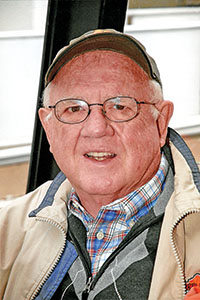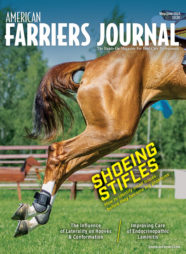When postcard ballots were recently circulated among Pennsylvania farriers and horse owners by an unknown group threatening the future of farriers doing foot work, you can understand why many people were in an uproar.
The Horse Wellness Alliance of Blue Bell, Pa., stirred up a hornet’s nest when it erroneously maintained that language in House Bill 1418 might not let farriers do anything more than just apply shoes.
With input from at least one farrier, the group’s scare tactics were so confusing that farriers didn’t know whether to vote yes, no or not at all.
Skeptical horse owners were concerned that much of the work now done by farriers would have to be done by vets. The postcards led them to believe the previously-proposed language meant farriers could do nothing more than apply shoes. Their scare tactics even implied that farriers might not be able to trim feet, fit special shoes or treat thrush, abscesses and bruises.
The group, which nobody in Pennsylvania equine groups had ever heard of, mistakenly maintained that the current “farrier exemption” to this bill would do more harm than good.
Immediate Action Needed
As a result, the Pennsylvania Veterinary Medical Association (PVMA) Practice Act Task Force met with a representative of the American Farrier’s Association (AFA) in mid-August to discuss proposed changes to the Pennsylvania Practice Act.
New language will exempt a multitude of activities from the practice of veterinary medicine, including: “Any person performing normal husbandry practices on bovine, porcine, caprine, ovine or equine animals or avis. A farrier or a person actively engaged in the art or profession of horseshoeing as long as his actions are limited to the art of horseshoeing only.”
The newly-proposed language will enable members of the horseshoeing profession to continue practicing their trade as they have for the last 100 years without the fear that such activity someday might be considered the practice of veterinary medicine.
PVMA President Amy Hinton says it was never the intent of the Task Force to limit or impede the farriers’ services, nor to require that horseshoers work under the supervision of a licensed vet.
No Threat To Farriers
After considering the wording with AFA members, PVMA is confident this new language poses no threat to what has always been recognized between the farrier and veterinary professions and the equine community as standard industry practices of “the farrier and the art and profession of horseshoeing.”
Hinton says PVMA has developed excellent relations with AFA on this legislation as well as an upcoming continuing education seminars.
“PVMA welcomes the opportunity to work with AFA and other groups providing horseshoeing services on future projects where our interests overlap,” she says.
The main thing to remember is not to sign any form or ballot until you understand who is sponsoring it and what it means. As proven in Pennsylvania, officers of your local farrier’s organization are your best bet for getting answers.








Post a comment
Report Abusive Comment